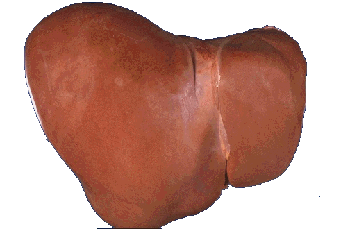
Normal liver without any disease
Hepatitis C
Hepatitis means inflammation of the liver. Toxins, certain drugs, some diseases, heavy alcohol use, and bacterial and viral infections can all cause hepatitis. Hepatitis is also the name of a family of viral infections that affect the liver; the most common types in the United States are hepatitis A, hepatitis B, and hepatitis C. Chronic hepatitis C is a serious disease than can result in long-term health problems, or even death.
Cause
Hepatitis C is a contagious liver disease that results from infection
with the hepatitis C virus (HCV). it can range in severity from a mild
illness lasting a few weeks to a serious, lifelong illness. There are 6
genotype of in general 6 type of HCV virus with 50 subtypes. Most common
genotypes are genotype 1,2, and 3. Type 1 is the most common in the US.
Transmission
There are several ways to transmit HCV which are almost same as HIV and
HBV. The basic of transmission is to transmit the infected body fluid from
one person to a healthy person. The virulence or capacity of the virus to
replicate itself is one of the highest among the viruses infecting humans. A
very small number of virus load can result in full fulminant infection.
Therefore, in hepatitis C a single exposure to the virus can lead to full
blown infection. This can happen just a few days after the exposure or
remain silent for decades before it shows up any complications or signs of
infection. There are several examples listed below.
Sexual intercourse including vaginal, oral or anal.
Current or former injection drug users, Recipients of
clotting factor concentrates made before 1987, when more advanced methods
for manufacturing those products were developed.
Recipients of blood transfusions or solid organ
transplants before July 1992, when better testing of blood donors became
available
Chronic hemodialysis patients, Persons with known
exposures to HCV, such as healthcare workers after needle sticks involving
HCV-positive blood or splash of infected blood or body fluid to mucous
membranes like eyes or mouth or any cut surface in skin.
recipients of blood or organs from a donor who tested
HCV-positive persons with HIV infection, Children born to HCV-positive
mothers. Body piercing and tattoo. Sharing personal items as razors and
toothbrush.
Sexual intercourse including vaginal, oral or anal.
Current or former injection drug users, Recipients of clotting factor concentrates made before 1987, when more advanced methods for manufacturing those products were developed.
Recipients of blood transfusions or solid organ transplants before July 1992, when better testing of blood donors became available
Chronic hemodialysis patients, Persons with known exposures to HCV, such as healthcare workers after needle sticks involving HCV-positive blood or splash of infected blood or body fluid to mucous membranes like eyes or mouth or any cut surface in skin.
recipients of blood or organs from a donor who tested HCV-positive persons with HIV infection, Children born to HCV-positive mothers. Body piercing and tattoo. Sharing personal items as razors and toothbrush.